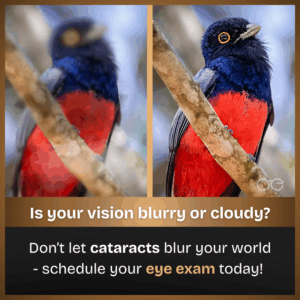Cataracts Unveiled: Recognize Signs & Symptoms Early for Clearer Vision
Clear Vision, Clear Life: Recognizing Cataracts and the Importance of Annual Eye Exams
Have you noticed your vision isn’t as sharp as it once was, like trying to see through a frosted window? You’re not alone. Cataracts—a condition where the natural lens of your eye becomes cloudy—might be the cause, and early detection is key.
What Are Cataracts?
Cataracts occur when the normally transparent proteins in your eye’s lens begin to change—whether through breakdown, misfolding, or other protein alterations—and subsequently clump together. This aggregation forms cloudy areas that interfere with the passage of light, leading to blurry, hazy, or dim vision. Over time, as these protein clusters grow, the clarity of your sight diminishes, which is why early detection and regular eye exams are so important for maintaining good vision. Some good news: with modern treatments, cataracts are highly manageable when caught early.
Recognizing the Signs
Be on the lookout for these common symptoms:
- Blurred Vision: Like looking through a foggy window.
- Difficulty with Glare: Particularly noticeable around headlights or bright lights.
- Faded Colors: Colors may seem less vibrant or more yellowed.
- Halos Around Lights: Those dreamy rings around lamps are a red flag.
- Poor Night Vision: Dim lighting can make it especially hard to see.
Even if these changes happen gradually, it’s crucial to get them checked early. Your eyes might be trying to tell you something important!
Understanding the Risk Factors
While aging is the biggest risk factor, other elements can increase your chances of developing cataracts:
- Family History: Genetics can play a role.
- Diabetes: High blood sugar contributes to lens clouding.
- Sun Exposure: UV rays from the sun can speed up cataract formation.
- Smoking: The chemicals in cigarettes can damage your eyes.
- Previous Eye Injuries: Past trauma can set the stage for future issues.
Knowing these factors empowers you to take action—especially if you fall into one or more high-risk categories.
The Critical Role of Annual Eye Exams
Think of your annual eye exam as a tune-up for your most vital instrument: your vision. Regular check-ups not only help spot cataracts early but also monitor for other eye conditions that could develop alongside them. An annual exam is your frontline defense in maintaining a sharp, clear view of the world around you.
Our experienced team is passionate about helping you protect your vision, ensuring that any changes are addressed before they become major concerns. Whether you’re experiencing subtle shifts or outright changes, don’t wait for things to get worse—your eyes deserve the best care.
Take Action Today
Don’t let cataracts cloud the beauty of your world. Make your vision a priority by scheduling your annual eye exam today. Our friendly specialists are here to guide you, answer your questions, and help you maintain a vibrant, clear outlook on life.